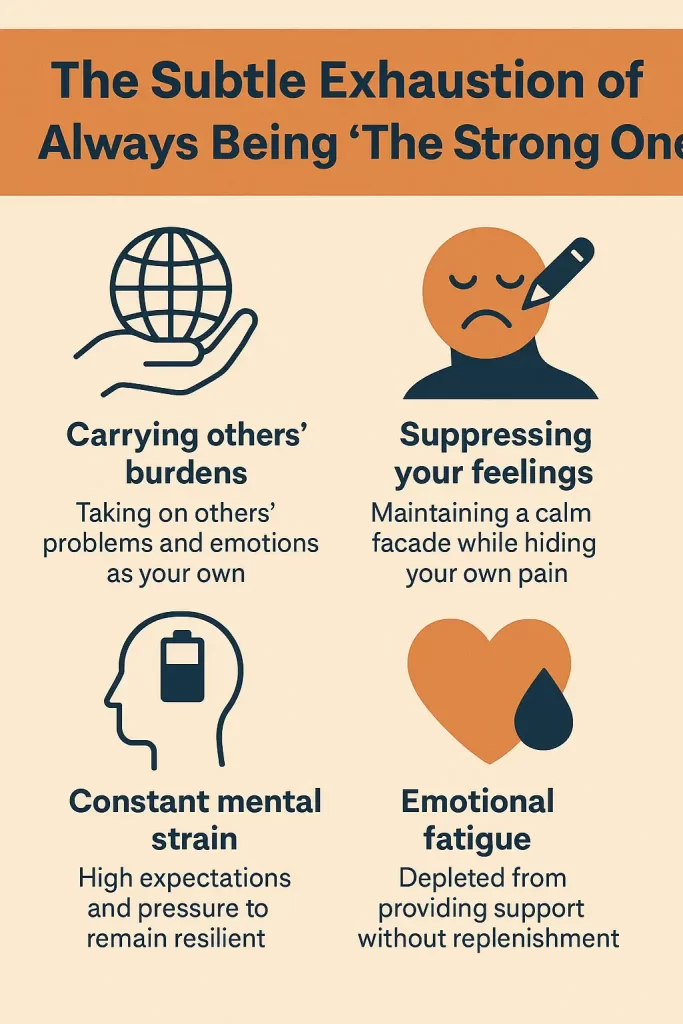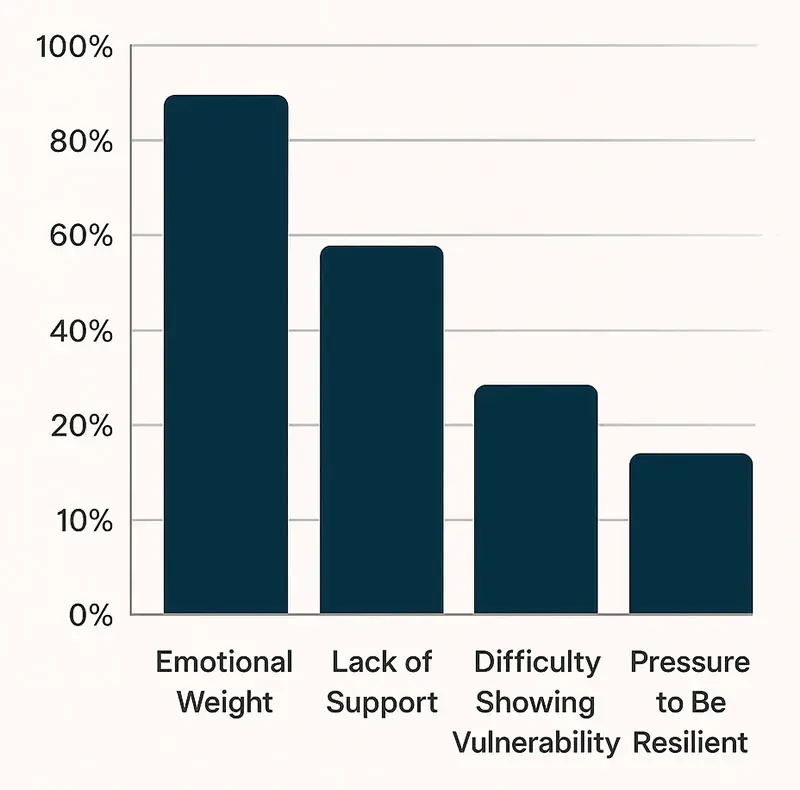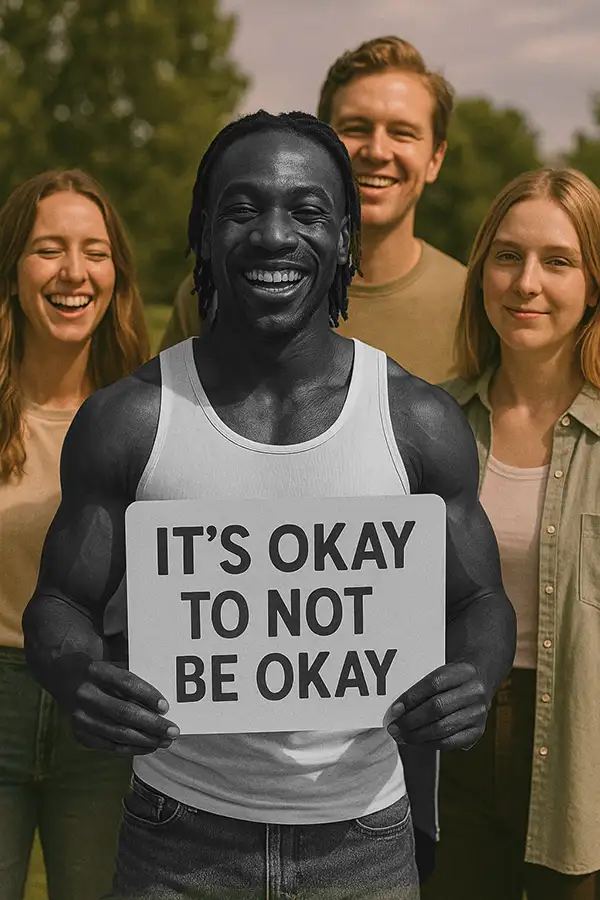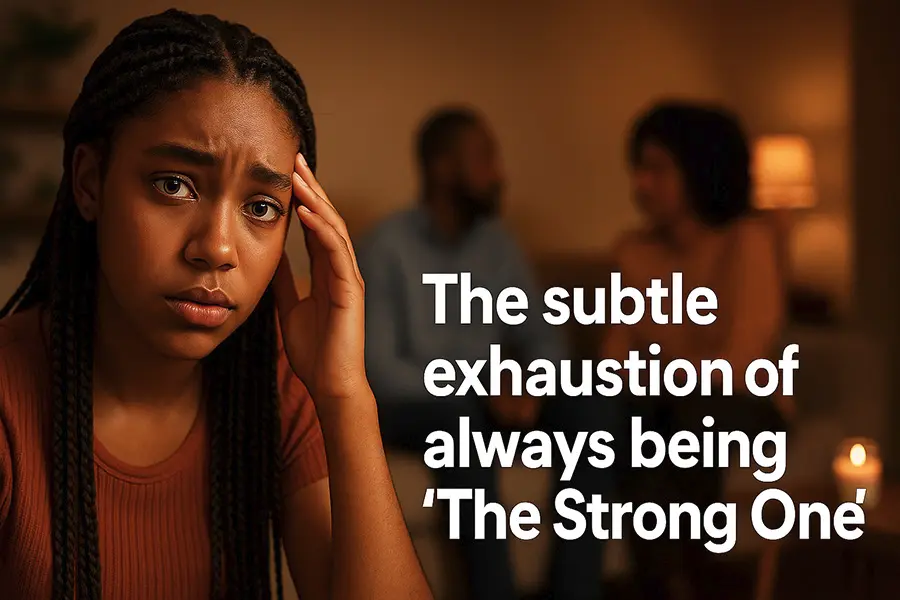Ever feel like you’re the one everyone turns to when things go south, but when you’re falling apart, there’s no one around to catch you? Like, you’re the rock, the shoulder to cry on, the voice of reason in the chaos, but deep down, you’re crumbling too? If that hits home, you’re probably the ‘strong one’ in your circle, and let me tell ya, it’s not all it’s cracked up to be.

This article dives into why being that person can leave you quietly burnt out, how to spot the signs, and ways to let yourself soften without feeling like you’re letting everyone down. We’ll explore the roots of this fatigue, real stories from folks who’ve been there, and practical tips to reclaim your energy. For more on handling emotional load, check out our post on The Strange Guilt of Having Needs. And Psychology Today has a solid piece on emotional labor that ties right in. Oh, and keep an eye out for our infographic on spotting strong friend fatigue it’s a quick way to see if you’re in the danger zone. Ready to give your heart a break? Let’s get into it. 😊

What It Means to Be the ‘Strong One’
Being the ‘strong one’ is like being the glue in your group the person who keeps it together when everyone else is losing it. You’re the friend who listens to late-night rants, the coworker who stays calm in a crisis, the family member who mediates fights. It’s a role that often feels good at first, like you’re valuable and needed. But over time, it can turn into a trap, where your own needs get pushed aside because you’re too busy holding up everyone else.
This isn’t just a personality thing it’s often rooted in how we were raised or what we’ve been through. Maybe you grew up in a family where emotions were a no-go, so you learned to be the stable one. Or perhaps you’ve been through some tough stuff, like loss or trauma, and being strong became your survival mode. Whatever the reason, being the ‘strong one’ means you’re always on, always available, always putting others first. But here’s the kicker: rocks don’t cry, and eventually, that pressure builds until you crack.

I didn’t even realize I was the ‘strong one’ until a friend pointed it out. She was like, “You’re always there for us, but who’s there for you?” It hit me like a ton of bricks I’d been playing this role my whole life, and I didn’t know how to stop. If you’re the one who’s always got it together on the outside but falling apart on the inside, this fatigue is real, and it’s okay to admit it.
The Hidden Fatigue Behind Emotional Strength
When you’re the ‘strong one,’ people forget you’re human too. They see you as unbreakable, so they lean on you without thinking about the weight. But that weight piles up, creating a kind of emotional debt unprocessed grief, swallowed fears, invisible loneliness. You become the safe place for everyone else’s pain, but where’s your safe place?
This fatigue often starts subtle. You suppress your emotions to stay composed, thinking it’s what makes you valuable. But over time, it leads to resentment, numbness, or even physical symptoms like headaches or tight shoulders. I remember days where I’d listen to my sister’s drama for hours, then collapse in bed feeling empty. It wasn’t her fault I’d never told her I needed a break.

The thing is, strength isn’t about never breaking. It’s about knowing when to bend. But when you’re always the one holding it together, bending feels like failure. You might minimize your struggles because “others have it worse,” or feel guilty for expressing sadness. It’s like you’re wearing a mask of strength, but under it, you’re exhausted. 😔
How ‘Being Strong’ Becomes a Hidden Burden
It usually starts with good intentions. You’re naturally dependable, or maybe you learned early on that vulnerability wasn’t safe. Over time, these patterns solidify: you’re the one others turn to in crisis, the suppressor of your own emotions, the one who rarely asks for help because it feels selfish. People praise your “resilience,” but they miss your exhaustion.
In my case, it was a family thing. Growing up, my mom was sick a lot, so I became the “stable one” for my siblings. I suppressed my fears to keep everyone calm, and that carried into adulthood. Friends would call me the “rock,” but rocks don’t get tired or so I thought. The longer I carried everyone’s struggles while hiding my own, the more depleted I felt. It was like I was a battery for everyone else, but nobody was charging me.

This burden can show up in subtle ways, like feeling guilty for taking a day off or resenting the people you love because they’re leaning on you too much. It’s not about being weak it’s about being human in a role that doesn’t allow for humanity.
Signs You May Be The ‘Strong One’ In Burnout

This fatigue is sneaky it doesn’t hit all at once. Here are some signs you’re the ‘strong one’ running on empty:
- Minimizing Your Own Struggles: You brush off your problems with “It’s not that bad” or “Others have it worse.”
- Guilt Over Emotions: Feeling sad or overwhelmed makes you feel like you’re letting people down.
- Physical Tension: Your body’s always tight stiff shoulders, clenched jaw, random headaches.
- Rarely Receiving Care: You’re always giving support, but nobody asks how you are.
- Private Breakdowns: You only let yourself fall apart when no one’s looking, like late at night or in the shower.
- Resentment Building: You start feeling bitter toward the people you help, even if you love them.
I ignored these signs for years. I’d smile through my friends’ crises, then cry in my car on the way home. It wasn’t until I snapped over something small like a friend asking for advice yet again that I realized I was burnt out. If you’re seeing these signs, it’s time to give yourself permission to step back. You’re not a failure for needing a break you’re human

Where This Pattern Comes From
Being the ‘strong one’ doesn’t happen by accident. It’s often rooted in early survival strategies:
- Emotionally Unavailable Caregivers: If your parents were distant or overwhelmed, you might’ve learned to handle things alone to avoid burdening them.
- Early Family Roles: Maybe you were the caretaker for siblings or the peacemaker in fights. I was the “responsible” kid in my family, always stepping in to calm things down.
- Perfectionism as Protection: If you were praised for being “mature” or “independent,” you might’ve linked your worth to being strong, fearing vulnerability would make you less lovable.
- Trauma’s Influence: Past trauma can wire your nervous system to associate vulnerability with danger, so you stay strong to stay safe.
In my childhood, my dad left when I was young, so I became the “man of the house” for my mom and sister. I suppressed my grief to be the stable one, and that pattern followed me into adulthood. It’s not your fault if you’re stuck in this role it’s how you survived. But now, it’s time to thrive.
The Nervous System Cost of Performing Strength
Always being strong isn’t just emotionally tiring it’s hard on your body too. Your nervous system stays in fight-or-flight mode, pumping out cortisol like it’s going out of style. This can lead to:

- Prolonged Stress: Your body’s always on high alert, which can cause adrenal fatigue and hormonal imbalances.
- Digestive Issues: Stress messes with your gut, leading to stomachaches or IBS-like symptoms.
- Sleep Disturbances: You might have trouble falling asleep or wake up feeling unrested.
- Immune Compromise: Chronic stress weakens your immune system, making you more prone to colds or illnesses.
- Emotional Numbness: You might feel disconnected from joy or happiness because you’re so used to suppressing everything.
I started noticing this when I got migraines after long days of supporting friends. My body was like, “Enough already!” Healthline says chronic stress can even increase your risk of heart disease by 67%. That’s no joke your strength is literally costing you your health

How to Gently Step Out of Constant Strength Mode
Letting go of the ‘strong one’ role doesn’t mean you’re weak it means you’re balanced. Here are five ways to start, with real examples to show you how it’s done:
1. Practice Saying, “I’m Not Okay Today”
Admitting you’re struggling is a big step. Try it with a trusted friend: “I’m having a rough day can we talk?”
I did this with my sister. I said, “I’m not the strong one right now I need a break.” She was shocked at first, but then she stepped up and supported me for once. It was like a weight lifted.
2. Let Safe People Hold You
Find one or two people you trust and let them in. Say, “I need a hug” or “Can you listen for a bit?”
This hit home for me when I told my partner, “I’m tired of being strong can you just hold me?” He did, and it was like I could finally breathe.

3. Stop Explaining Every No
You don’t owe a million reasons for setting boundaries. Say, “I can’t make it tonight,” and leave it at that.
I used to over-explain every no, but now I just say, “I’m gonna pass thanks though.” It’s freeing.
4. Journal Your Unspoken Feelings
Write down what you’re really feeling, even if it’s messy. It’s like giving your emotions a place to land.
I started journaling every night, scribbling stuff like, “I’m tired of carrying everyone.” It helped me process without bottling it up.
5. Remind Yourself: Being Soft Isn’t Failure
Strength includes softness. It’s okay to need help or take a day off. True resilience is knowing when to rest.
This was a game-changer for me. I stopped seeing vulnerability as weakness and started seeing it as part of my strength. 😊

The Science Behind Strong Friend Fatigue
Let’s get a little science-y. When you’re always the strong one, your nervous system stays in sympathetic mode (fight-or-flight), pumping out cortisol and adrenaline. This keeps you alert but exhausted. Over time, it can lead to adrenal fatigue, where your body can’t keep up with the stress. Bradley University Counseling Center says this can increase heart disease risk by 67%.
Your brain’s involved too. The prefrontal cortex, which helps regulate emotions, gets overwhelmed, making it harder to process your own feelings. A 2020 study in Frontiers in Psychology found that emotional suppression reduces life satisfaction and increases anxiety.
Self-compassion can flip the script. A 2017 meta-analysis in Personality and Social Psychology Bulletin showed self-compassion practices reduce anxiety by calming the amygdala (your fear center). It’s like teaching your brain that it’s okay to not be okay.
Here’s the data:
| Impact | Statistic | Source |
|---|---|---|
| Heart Disease Risk | 67% increase with chronic stress | Bradley University Counseling Center |
| Anxiety Increase | Emotional suppression linked to higher anxiety | Frontiers in Psychology |
| Sleep Disruption | Stress reduces sleep quality by 30% | Sleep Foundation |
Your body’s not built to carry everyone’s weight forever. These strategies can help you recharge and find balance.
Other related articles
- The Strange Guilt of Having Needs
- Emotional Self-Care: Why You Need It
- Mindful Living: How to Start Today
- Self-Care in Relationships
- Overthinking at Night: How to Stop

FAQ
You’ve been wired to think your needs are a burden. It’s just old patterns practice small asks, and it’ll feel less guilty over time.
That pain’s real, and it might show who in your circle isn’t reciprocal. Start sharing small struggles to see who steps up.
Maybe some, but the ones that matter will stick around and even appreciate the real you. Healthy bonds survive vulnerability.
If you’re suppressing emotions, feeling resentful, or breaking down in private, that’s a sign. Listen to your body it knows.
Absolutely! True strength includes softness it’s about balance, not being unbreakable
How to Start Addressing Strong Friend Fatigue
- Admit You’re Tired: Write down, “I’m exhausted from being strong, and that’s okay.”
- Find Safe People: Pick one or two trusted friends to share a small struggle with.
- Practice Small Asks: Ask for something simple, like, “Can you listen for a bit?”
- Set Boundaries: Say no to one draining request this week.
- Recharge with Self-Care: Spend 10 minutes a day on something you love.
- Use Grounding Techniques: Try deep breathing when guilt creeps in.
- Get Professional Help: If it’s too much, a therapist can guide you to balance.
Conclusion
You don’t have to carry it all alone. Being the ‘strong one’ is a gift, but it’s also a burden when it’s all you are. By admitting you’re tired, letting others in, and setting boundaries, you can find a new kind of strength one that includes rest, vulnerability, and asking for help. Your worth isn’t measured by how much you can carry it’s in who you are, messy parts and all.
So, today, try one small step. Tell a friend you’re struggling. Take a break from being the rock. You deserve support, even if you’re usually the one giving it. Let’s make space for the soft side it’s stronger than you think. 😊

Citations:
- Psychology Today – Emotional Labor Basics: Defines emotional labor managing and expressing emotions to meet job or social expectations and highlights its draining nature, especially when authentic feelings conflict with required behavior.
- Healthline – Effects of Chronic Stress: Explains how prolonged stress activates the fight-or-flight response and negatively affects mood, immunity, digestion, and heart health.
- Mayo Clinic – Chronic Stress Health Risks: Details long-term stress impacts such as anxiety, depression, memory problems, high blood pressure, sleep disturbances, and more
Don’t miss related articles:
✨ Last updated on 11.08.2025











Leave a Reply